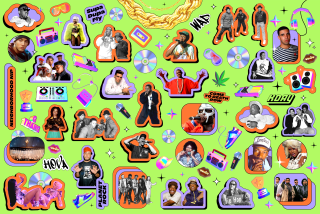Eric (Big Daddy) Nord; âBeat Movementâ Leader
Eric (Big Daddy) Nord, a 6-foot, 8-inch bear of a man who was forced by a lack of paint to title his avant-garde nightclub the hungry i, has died in San Jose at the age of 68, it was reported over the weekend.
United Press International said that Nord, who died in a convalescent home of ailments resulting from his weight of 400 pounds and who was credited with helping establish the âbeat movementâ in both Northern and Southern California cafes in the 1950s, died Wednesday.
The bearded Nord, who prowled San Franciscoâs North Beach and Los Angelesâ Venice beach in old sea captainâs hats, using a giant tricycle for transportation, operated a series of coffeehouses and clubs during the colorful and controversial years that beatniks dominated the cultural scene.
The fashion of the era was to offer guitar-accompanied protest songs and poetry in a setting of dark rooms where the haze was created by sweet, pungent and illegal smoke.
In 1950, he opened his first nightclub on Broadway in San Francisco and titled it âhungry i.â It later became a springboard for aspiring entertainers after Nord sold it to Enrico Banducci for $800.
Among those getting their start there were Bill Cosby, Mort Sahl and the Kingston Trio.
âI was going to call it the Hungry Intellectual, but I ran out of paintâ for the sign, Nord would tell interviewers.
Today the hungry i features topless shows, according to Marvin Boyd, one of the current owners.
Nord tried many business ventures, from real estate to party rooms to bookstores to restaurants, and between times worked as a bartender or bouncer.
He was dubbed âThe King of North Beachâ by San Francisco columnist Herb Caen, who coined the term beatnik (coupling âbeat generationâ with Sputnik). Nord sometimes worked as an actor and also read his own poetry and that of others, including Ovid, at his establishments.
In 1959, he came south and opened the Gas House in Venice, operating a beat hangout in a beachfront building that had once been a fashionable drugstore and then a haven for the homeless until Nord turned it into an artistic center for lost souls.
For three years it was a place where writers and musicians could not only live but entertain in what Nord said was âthe peaceful atmosphere of Venice.â It lasted until neighbors complained about the noise and Nord was forced to seek an entertainment license, which was denied.
He moved to Hawaii in the 1960s, but returned after a short stay. âI was involved in a multimillion-dollar health spa but I got a virus,â he explained.
He also became involved with a vegetarian group that sought to establish a colony in Guatemala but the effort was cut short by a revolution, friends said.
Over the years, Nord and the law clashed over charges ranging from passing bad checks to contributing to the delinquency of minors to creating a public nuisance.
He eventually became disenchanted with the beat movement âbecause it seemed to be going nowhere,â recalled a friend, Telemachos Greanias of Los Gatos. âHe said what killed it was people in the movement who were misguided, and then dope came into the picture.â
More to Read
The biggest entertainment stories
Get our big stories about Hollywood, film, television, music, arts, culture and more right in your inbox as soon as they publish.
You may occasionally receive promotional content from the Los Angeles Times.










